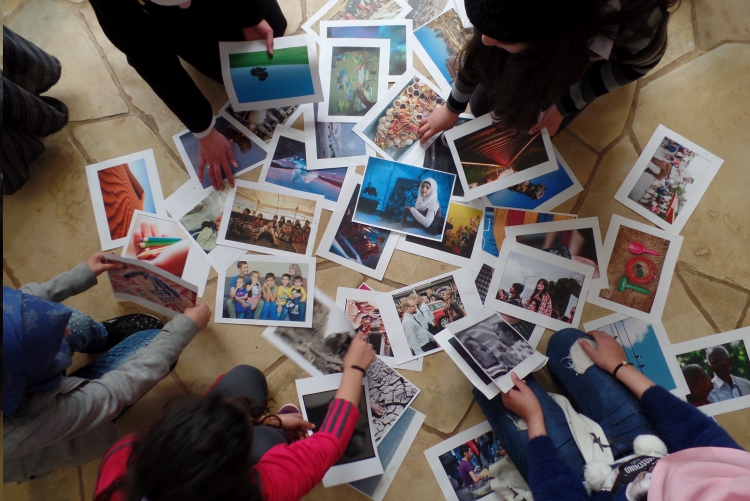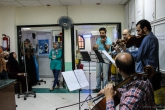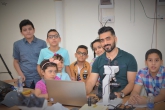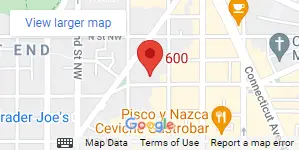Fulbright alums from the Middle East and North Africa who received Fulbright awards administered by Amideast are eligible to apply!
*Competition Now Closed*
Sponsored by the U.S. Department of State's Bureau of Educational and Cultural Affairs (ECA), the Alumni Community Action Grant (ACAG) is intended to help Fulbright Program alums exercise their creativity and leadership skills to make an impact in their communities. Alums can apply for up to $10,000 USD towards implementing a community-based individual or group project that builds on the experience they gained during the Fulbright Program.
Apply for the ACAG for the opportunity to receive direct support to turn your creative ideas into reality! We welcome innovative community-oriented ideas that put your leadership skills into action.
ELIGIBILITY REQUIREMENTS
- Applicants must be alums of either: the Fulbright Foreign Student Program for the Middle East and North Africa, the Junior Faculty Development Program, or the Fulbright Visiting Scholar Program for Iraq, whose Fulbright Programs were administered by Amideast on behalf of the U.S. Department of State.
- IMPORTANT: Before you start your ACAG application, please check your grant's original Terms of Agreement to confirm Amideast administered your Fulbright Program, not another entity. If you are not sure and cannot confirm your records, email kdallimore@amideast.org for assistance.
- Applicants must have completed their J-1 visa, two-year home residency requirement
- Applicants must be citizens or residents of the following areas: Algeria, Bahrain, Egypt, Gaza, Iraq, Jordan, Lebanon, Libya, Morocco, Oman, Saudi Arabia, Syria, Tunisia, the United Arab Emirates, the West Bank, or Yemen.
- Amideast, U.S. Agency for International Development, U.S. Department of State, and Fulbright Commission staff members, independent contractors, and/or immediate family members are ineligible.
- Previous alumni grant recipients must wait a minimum of two years after receipt before submitting another application.
GRANT GUIDELINES
- Requested funds may not exceed $10,000 USD.
- Proposed activity must take place in the MENA region.
- The use of Fulbright logos on project materials must be approved by Amideast and the U.S. Department of State prior to use. You must submit the materials to Amideast at least two weeks in advance of use for review.
- The grant authorization period starts January 2, 2025, through June 30, 2025. Proposed activities must be within this grant authorization period.
PROJECTS MUST BE:
- feasible;
- demonstrate careful thought and planning;
- designed for rapid implementation; and
- demonstrate the ability to achieve a measurable positive impact on a particular community.
- Applicants are responsible for all phases of the proposed activity from initial planning to implementing the activity and bringing it to successful completion.
- If implementing a group project, the lead organizer must be an eligible Fulbright alum; other participants are not required to be Fulbright alums.
- Grantees must submit a final report to Amideast no later than 30 days after the completion of their activity. Successful applicants will receive specific guidelines on what information to include in the final report.
- Grantees who use social media to promote their activity are requested to notify Amideast about their posting so that the activity can be shared on Fulbright social media platforms. Grantees are required to follow the official guidance outlined on the ACAG Social Media Guidelines page.
- Amideast reserves the right to request additional information from applicants.
EVALUATION CRITERIA AND ADDITIONAL CONSIDERATIONS
- Applicants should articulate a logical relationship between the proposed activities and desired outcomes – presenting the cause and effect that the project hopes to achieve. Proposals will be evaluated based on the quality of the main idea and the implementation plan.
- Applicants should demonstrate the necessary leadership ability and relevant skills to implement the proposal.
- When designing their projects, applicants are encouraged to utilize SMART goals (specific, measurable, achievable, relevant, time-bound).
- Proposals will be evaluated based on the feasibility of the project, including the scope of what the proposal seeks to achieve.
- The proposal should align with the spirit of the Fulbright Program’s mission and goals, including fostering mutual understanding, building people-to-people connections, exchanging ideas, and finding solutions to shared international concerns.
- Proposals will be evaluated based on the potential impact and benefit to the local community. Applicants are encouraged to submit proposals that are inclusive and benefit diverse and/or underserved populations in their community. The target population should be clearly defined. Furthermore, proposals that demonstrate a sustainable impact will be viewed favorably.
- Applicants should outline a plan to promote their project using various communication tools as appropriate, such as social media. Proposal evaluation will consider the effectiveness and creativity of the communications plan, but with an understanding that broad publicity may not be appropriate for some proposals.
- Preference will be given to first-time recipients for a Fulbright Alumni Grant (ACAG or ADG). If you were awarded an ACAG in the past, repeat applicants should articulate the link between their Fulbright Program experience, their most recent ACAG activity, and their new proposal. Proposals will be evaluated based on how the proposed activities build on the applicant’s experience during the Fulbright Program and their most recent ACAG activity.
RESTRICTED ACTIVITIES AND COSTS
The following activities and costs are not eligible for funding through ACAG:
- International travel, unless specifically justified within the project.
- Projects of a commercial or profit-making nature.
- Organizational start-up costs, including setting up a new center or office.
- Purchase of materials and/or electronics without strong project justification.
- Cash prizes.
- Financial compensation for the applicants’ or group members' time or effort spent planning and implementing the project.
- Domestic travel costs exceeding the rates established by the U.S. Department of State. Find the rates here: https://aoprals.state.gov/web920/per_diem.asp.
EXAMPLES OF PREVIOUS SUCCESSFUL ALUMNI COMMUNITY ACTION GRANT PROPOSALS INCLUDE:
- A series of workshops teaching children the fundamentals of computer science and robotics.
- An entrepreneurship “boot camp” training youth how to start a business.
- Introducing the art and benefits of home composting to elementary school children, through a series of hands-on workshops, tailored materials, and educational videos.





 This is
This is 